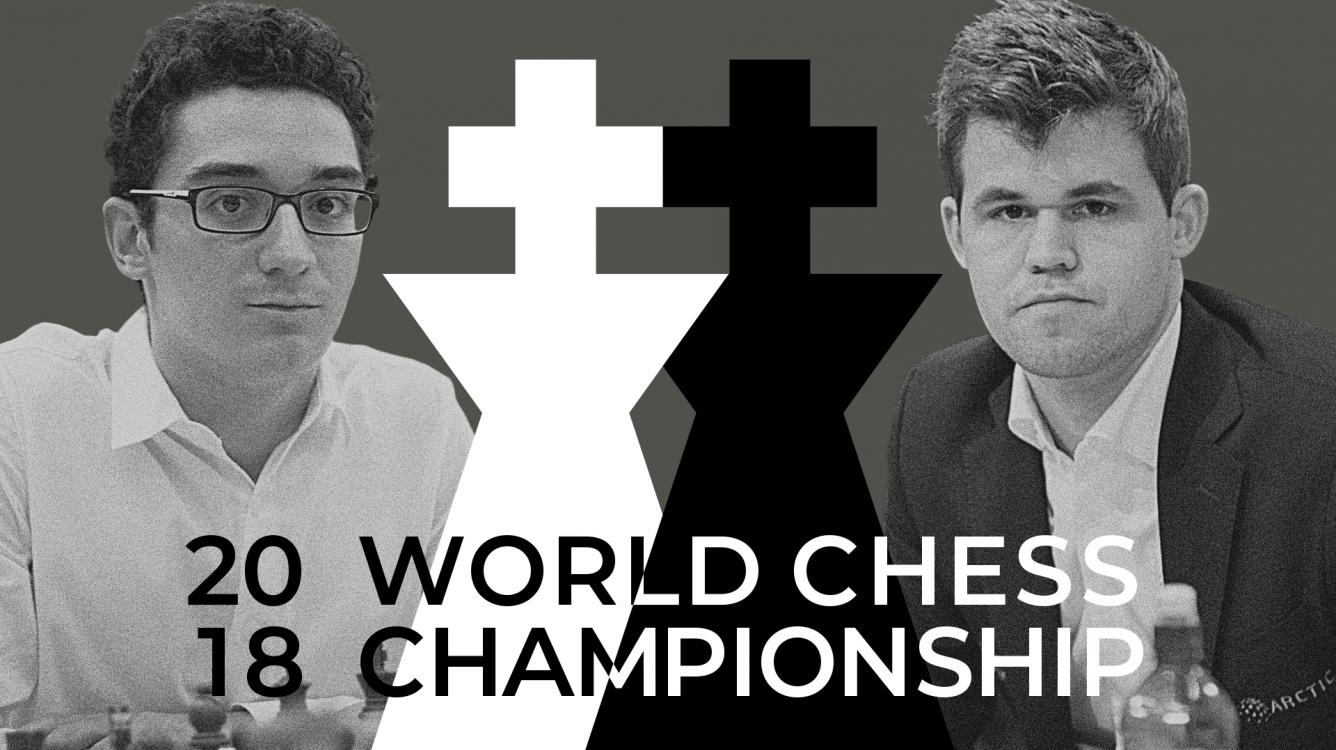
2018 World Chess Championship: Halftime
GM Jonathan Tisdall shares his reflections on the Carlsen-Caruana world championship at halftime. (You can read his preview of the match here.) For convenience, we've copied the games with GM Sam Shankland's annotations from our news reports.
I arrived in London for Game 5, exchanging the weird sense of omnipresent national fervor for the long absent joy of experiencing this most intense of all chess events live and up close. Yes, in many ways watching from the comfort of your home with a plethora of excellent and entertaining commentary teams, TV shows and expert analysts is amazing. But the often deafening hum of a global press room, being able to scrutinize and quiz the players and their entourages, to feel the tension in person - is a unique and irreplaceable way to enjoy this event.
With limited space and a bit of lag, I am going to make this halfway report lopsided, and focus on a few dramatic moments, probably in overenthusiastic detail. On the other hand, there have been six draws, so leaving the games to the daily reporters and the furore to the feature story makes sense.
With a nod to having an overview and compiling a midway scorecard, lets do a bit of summary before moving on to the screaming points.
Game 1: FC-MC
This was a full-blooded punch-up that lived up to the match hype and illustrated most of the talking points before the event, all in a single days action. Magnus surprised by playing the Sicilian, and went straight for the throat by adopting a sharp plan and executing in even sharper fashion. He built up a winning position ... and then frittered away virtually all of his advantage in that weird, hesitant fashion that has plagued him in recent years. A few hours of token torture ensued, with Caruana holding a slightly inferior rook ending without trouble.
Takeaways and talking points: The trajectory of their personal duels over the past year continued: Magnus playing with extreme ambition and faltering at the key moment. What could have been the most devastating start to a title match instead turned into a relief of a match debut for FC, and another near miss for MC.
If I had to choose, I'd call this a tiny victory for Caruana, who avoided catastrophe, which is always cheering, but more so because there are few things as haunting and irritating as not winning a won game, let alone the first game with black in a title match.
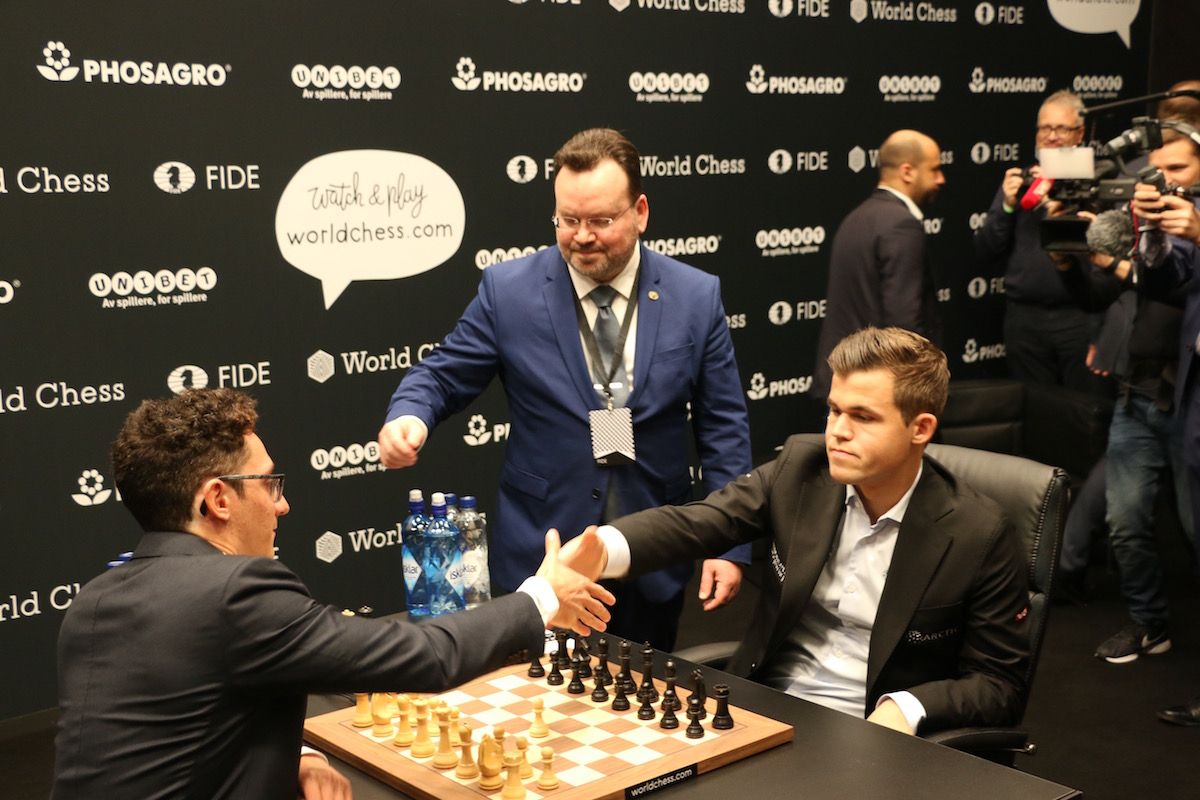
Game one starts, and the match is underway. | Photo: Mike Klein/Chess.com.
Magnus' Norwegian chums say that he is capable of only taking the positive from the clash, and will just focus on how well he played and his continuing grip on the challenger. Maybe, I know Magnus has a brilliant sporting psyche. (But can anyone really shrug off such an annoying miss...?)
Observations: Magnus clearly burnt a vast amount of energy in this game, and is visibly drained at the press conference. Fabiano gives a very eerie impression of being about as rested afterwards as upon arrival, and he is either totally serene, or has the world's best poker face. He can't be encouraged by being roughed up again, but if he is half as calm as he looks he will certainly file this as useful experience. This will only be potentially rattling if it sets the tone for future games, but odds are Magnus will not get this close often.
Game two: MC-FC
Caruana's turn to surprise and press with black, clearly shocking the champ with a very rare line. Carlsen soon has to stomp on the brakes and focus on finding a safe route to grovel a draw, and he does.
Takeaways and talking points: Caruana didn't reciprocate with a massive and likely equally fruitless session of rubbing his insufficient advantage in Magnus' face. Slightly surprising, from a psychological point of view.

London has had its typical kind of weather but overall November has been pleasant thus far. Here's Carlsen with his most trusted allies, second Peter Heine Nielsen and father Henrik. | Photo: Ole Kristian Strøm/VG.
Observations: Magnus again sounds and looks a bit weary afterwards, and in this game he did by far most of the work. Fabiano is again frighteningly calm and looks totally rested. No one can dispute that this was a plus Caruana day on the judge's scorecard, though very accurate defense from the champ.
Game three: FC-MC
Caruana exploits a slightly odd opening decision from Magnus and gets the first white edge of the event. He immediately crosses a wire in tis thinking and lets Carlsen build up his legendary micro-edge in an ending. Magnus rushes this, and a draw is relatively quickly agreed. No torture today.
'J'adoubegate' distracts from another peaceful result when Magnus adjusts a piece while Caruana is away from the board, and his lips are hard to see. NRK produces video and audio to show Magnus saying j'adoube, and chief arbiter Stéphane Escafre takes to 'tweeter' to assure the world that they are awake and doing their job. He seems like a fun guy.
Takeaways: People are talking about black being an advantage in the match. Come on, we're three games in and white actually got something today. I'd call this one a draw on the judge's card as well.

Carlsen wasn't too pleased with the opening. | Photo: Mike Klein/Chess.com.
Observations: Both players looked fresh and calm post-game. Magnus uses each press conference to fire off jokes and witticisms at every opportunity. He seems in the kind of good mood that he desperately needs to play his best. But is he too cheerful to be properly focused? And does anything raise Fabiano's blood pressure? I start to wonder if yoga might not prove to be the decisive weapon in this match, this combination of stamina and equilibrium is a perfect cocktail for an event like this.
Fun fact: There is a security guard in the playing room/board area 24/7. 24/7! Not just the daily full site sweep for various devices from a dedicated security crew. A live-in guard, to ensure no funny business can take place here.
Game 4: MC-FC
Finally something to scream about, and this starts before the game and may leave a lasting impression on the match. Videogate, or, has chess entered the modern viral / disinformation / conspiracy age?
I assume that the basics have been well reported, but essentially a short challenger's camp counter-promo was published, showing that Caruana and co. can also do sports and heavy preparation in upbeat fashion, but this is taken down quickly when a few viewers begin to scrutinize the positions on boards set up at the camp, and most astonishing of all, a camera is allowed to zoom in on a screenful of laptop showing a list of opening variation titles in a database.
This to me is the key item, and sets off two howling internal alarms, not just old journalism-related suspicion, but disinformation reflexes from both sides of the match camp fence. I immediately form two strong opinions: that this can be some kind of stunt to try and waste Carlsen camp time on bogus opening 'intel' possibly 'revealed' on the chessboards and laptop screen*; and that absolutely nothing useful whatsoever is visible on the screen, and that therefore the actual impact of this 'leak' is minimal to non-existent. This leads me to initially conclude that this will largely be an entertaining story, but be of little import in terms of the match.
* (Indeed, much of the list and the shots of board prep were linked, around Carlsen-Karjakin games.)
I quickly discovered that these seem to be minority views, and that NRK celebrity guest Anne Holt, famous for her crime fiction, is about the only person in the country that shares my suspicions. First, let me make my arguments.
Guess what they are watching 😂😂 pic.twitter.com/jV7pQNYeAi
— David Llada ♔ (@davidllada) November 13, 2018
Ladies and gentlemen of the jury
It's not just the legacy of covering matches steeped in Cold War or Soviet politics, I know from reporting and seconding that every opportunity to disseminate confusing or distracting information that can be picked up by the enemy camp is taken. This tends to be low level mind games, like trying to mislead the enemy about when a time-out will be taken (yes, those were the olden days) or sowing confusion about who hidden seconds are. That was just normal. Real nastiness, like genuine espionage or double agents/infiltrators were the stuff of conspiracies, often suspected but rarely proven.
The laptop zoom just baffles me, and still does. A top player will not let you near their laptop when it is packed away. The idea of letting an outsider near it when it is switched on I find borderline unbelievable. Next to it with a camera, mind-boggling. All of this when there is an experienced title second like Kasimdzhanov around adds a second layer of disbelief. Someone should have taken that camera guy out.
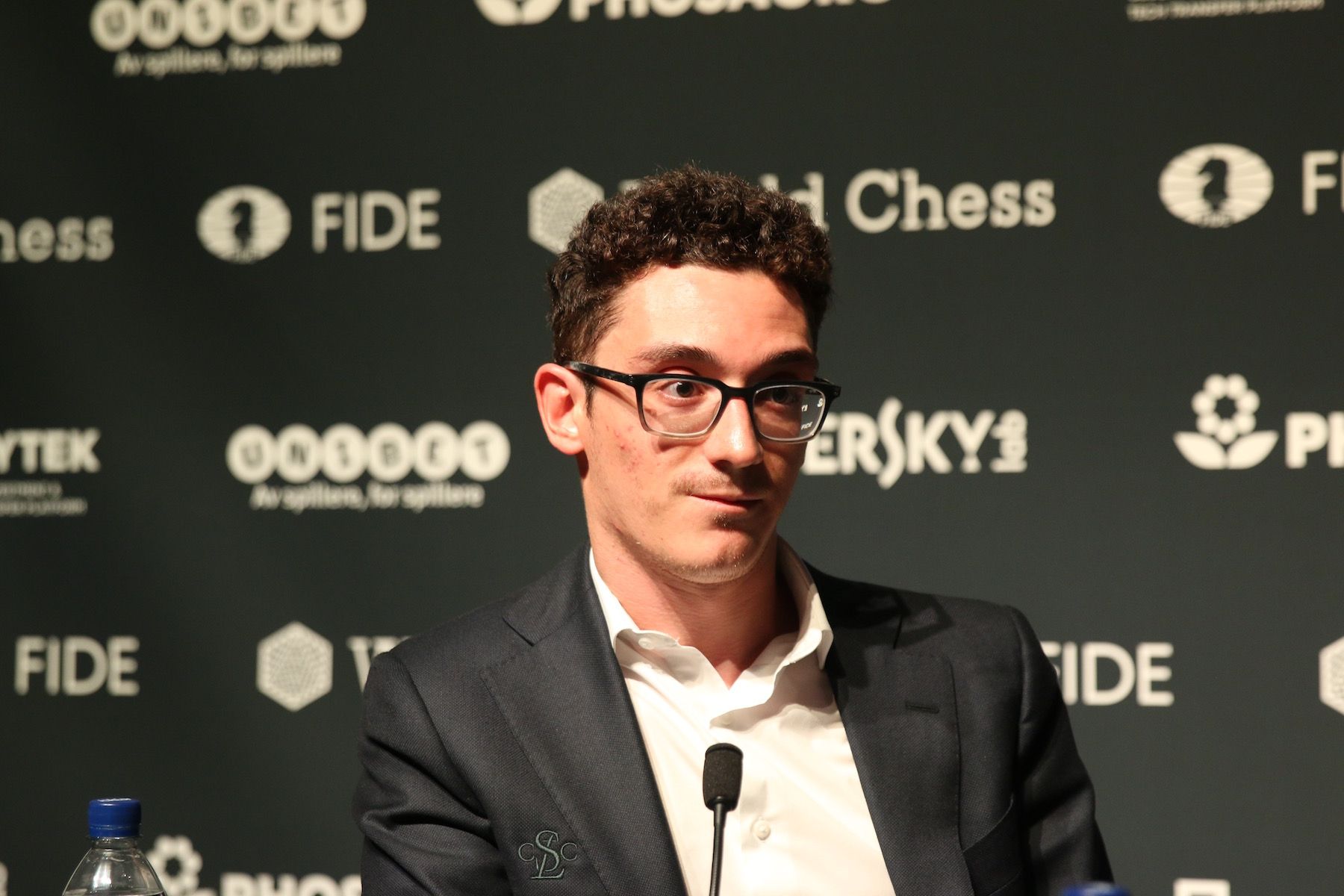
Caruana chose not to comment when he was first asked about the video. | Photo: Mike Klein/Chess.com.
Carlsen's manager Espen Agdestein tells me that similar blunders have nearly been committed by them, despite much experience and established security procedures. They have caught a 'secret' person revealed in video background despite efforts to blur all sorts of confidential info. Easily done he says. OK. But nothing was blurred in the St. Louis video. Nothing accidentally slipped through. Could there have been zero security thinking, when such 'valuable' laptop filming was allowed?
Maybe this footage was intended for post-match use, I heard. That doesn't fly either I'm afraid. Fabi's laptop contents are always going to be intel gold, there's no time limit on that. The number of people who have to f**k up on a massive scale for that video to be a pure revelatory accident strikes me as requiring more of a stretch of imagination than it being some kind of stunt. Especially since I don't see anything unknown revealed.
Well, if the video was showing just what we can see on the screen in this GIF, then it's not so big deal. It maybe just 1% of Caruana's preparation for the match. Also, it may even influence Carlsen negatively if he gives to it too much importance. LET'S PLAY #CHESS https://t.co/oVNKq4PZ54
— Miguel Illescas (@illescasmiguel) November 13, 2018
I don't know if the above are arguments for the prosecution or the defense, but I'll let it rest here. I realize that there are dangers of being misinterpreted when legendary Spanish reporter Leontxo Garcia approaches me in the London press room and says he needs a comment from me before he can publish his report - am I sticking to my argument in favor of the 'conspiracy theory'? Uh oh.
That guy in the jury
Leontxo and I go way back, to the Moscow Kasparov-Karpov clashes, and he just gives me a knowing smile when I refer him to our long education in disinformation and mind games, and to what that would have been like with modern communications and media manipulation.
I'm not the hold-out, the 12th man. Pulling down a video and asking people not to spread its content might be the fastest way to make something go viral, but people still get this wrong. There are enough reliable sources to convince me that the mortification being expressed by those linked to the video production and the tight-lipped anger of the few visible Caruana team members are genuine. The clincher for me is when Ian Rogers resigns as the US Chess reporter when his story about the affair is rejected for being too anti-Caruana, which speaks volumes about the discomfort levels around the incident in the USA.
I should also note that I saw the most likely 'conspiracy' scenario as the video generating genuine upset in the Caruana camp, since it would almost certainly emanate from a PR effort in St. Louis, and be an unsanctioned distraction.
But my bottom line is that this very intriguing story was basically just a potential waste of energy for the camps remains, and a few voices of agreement finally emerged.
1% ... nothing burger
Vishy Anand, no slouch when it comes to high-level intel told ChessBase: "There's nothing that dramatic that they gave away, except that you confirm that you're looking at the Petroff. On the other hand, this is completely useless information, if the Carlsen team — even if they felt that it's authentic — would they trust it, would they bet their life on it? They can't. I think both sides cannot take this ploy any further. So, in the end, it didn't matter, but at least it was more interesting than the game [four]".
Excellent mind-game summary - and one that contains a question of video authenticity.
Former Caruana manager Lawrence Trent blew a few gaskets on NRK TV calling the story a 'nothing burger' and: "The video showed absolutely nothing Magnus didn't know before, it showed the Petroff and the QGD. Those are variations Magnus already has covered, if he has prepared properly."
So. In conclusion, I think a convincing argument can be made for videogate being a stunt. I leave the verdict to the outcome of the inevitable sport of Internet argument. I don't believe it was a ploy. I don't think it should have any impact on the match above Illescas' 1%. Caruana and his men are too level-headed to let it bother them for very long, Carlsen and his are too experienced to use much time on trying to find hidden wisdom in a list of variation names.
Oh, and game four was another comfy draw for black. Everyone expected Magnus to pursue an obvious route to minor pressure, but neither player felt this would have produced anything of real note. Magnus' odd, hesitant play again sent the game into a ditch of sterile equality. No bonus points for either side.
Game five: FC-MC
Game five was an excellent bit of cut and thrust, Fabi finally springing a sharp opening line, Mags defusing it impressively. The press conference produced some laughs and quite a bit of food for thought.
Carlsen told the press that his favorite player from the past was "probably myself, like three or four years ago", a typically wry response that some read as egotistical. To me it has several other more compelling ingredients, since I have no allergy to top rated performers admitting they are or were exactly that. This joke says much more - about his recognition of years of frustration about dwindling returns, the chance that his top form may be permanently lost, and possibly a nod to the approaching challenge of age.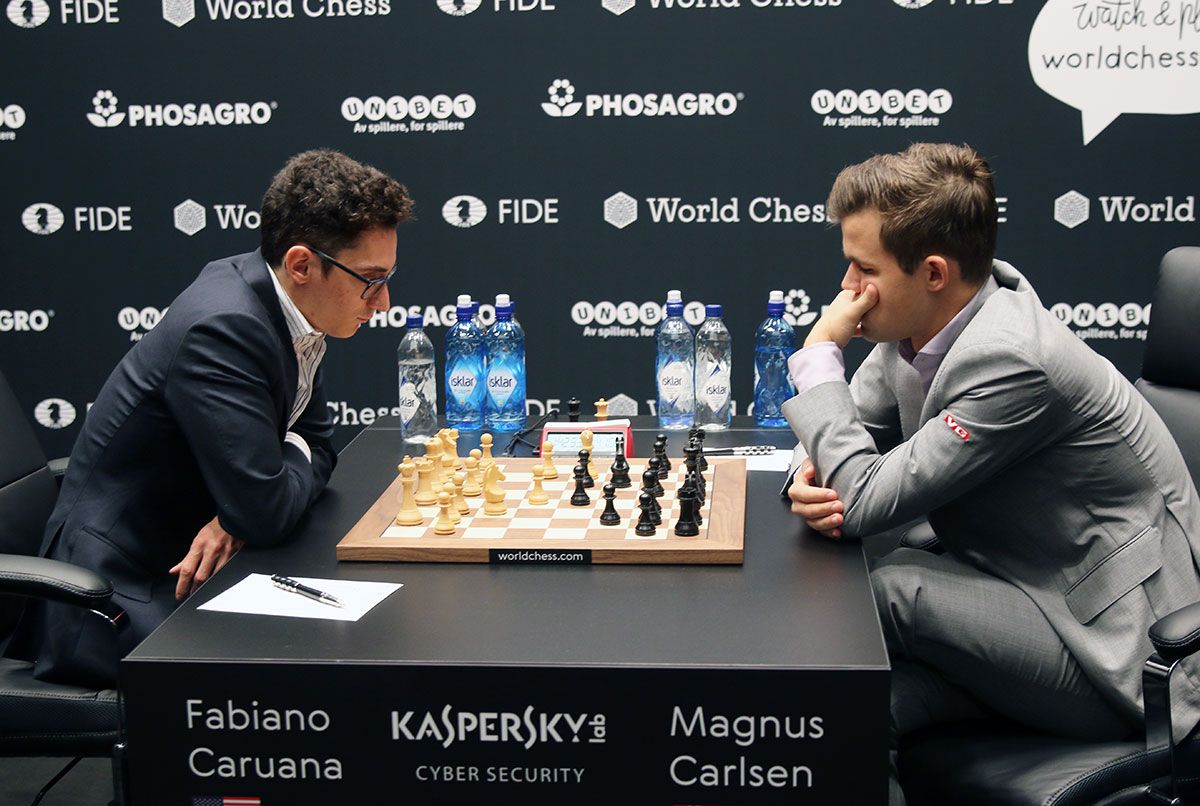
Caruana vs Carlsen, game five. | Photo: Mike Klein/Chess.com.
Narratives...
Caruana summed up game five as an opening that could get interesting if Black allowed it, but that Carlsen's preparation level had defused it. This was intriguing, because it seemed an unusually subjective conclusion from the challenger.
There were many who were on the spectrum of belief that Magnus had been working the line out at the board - possibly recalling some old or half forgotten analysis. He was quite hard to read, and his expression changed often. Fabiano's interpretation is of course an encouraging narrative, that his bold salvo had thudded against the champ's comprehensive preparation and sensible risk-avoidance.
I don't know which version is correct, and that is yet another aspect of the eternal mind-game that makes up a multi-faceted title match. Perhaps the most important thing is that each player interprets outcomes in a way that creates a positive version of their personal ongoing adventure.
Game six: MC-FC
Of course, sometimes the story is obvious. Some days you can scrutinize body language and philosophize and psychoanalyze the drama behind the game. On others, you just watch white wander into a long grovel after trading stuff against the Petroff, and just need to wonder why.
I have to confess I shared in the naive enjoyment of the early opening stampede of horses, until I heard Grischuk explain that this variation was common knowledge and widely discussed at the Isle of Man as a dud for white.
What the ...
If ever an argument was needed to bolster the credibility of the 'videogate had no real prep impact' crowd, Carlsen's handling of game six was heavy ammunition. This was not the result of enhanced preparation. It was... actually, what was it?
Grischuk may have again immediately hit the nail on the head - perhaps both camps have only worked hard on their blacks? Would explain a lot, given their attitudes to 'just playing'. White has that luxury in a pinch, but match survival means being bullet-proof with black. The Karjakin match was similar in many respects.
Is black the new white was a post-game six question, and even if the players continue to see it as somewhat coincidental, the sample size is steadily growing.
Going in to the break
If Magnus draws this he will have achieved the remarkable feat of being able to leave the board feeling like he has had a good result. #CarlsenCaruana2018
— Jonathan Tisdall (@GMjtis) November 16, 2018
(If Magnus draws this he will have achieved the remarkable feat of being able to leave the board feeling like he has had a good result.)
The live experience
Out there in the ether, inveterate Internet whiners had to resort to supercomputers to feel completely superior to the players in the final phase of game 6 - because 'regular' engines could not see the nuances in the ending. I always make a plea that people turn off their engines, and if they cannot comprehend the difficulties the world two best players are grappling with, then at least watch a strong person trying to cope. Somehow, feeling unable to understand without an engine doesn't seem to hinder many from feeling better than the world elite when they have one.
The critical phase of this ending kept the amazing Grischuk and Svidler in repeated confusion as they very nearly appeared to work out amazing intricacies, and a moment later were unable to reproduce or apply this knowledge in slightly different circumstances. At the press conference later, GM Ian Rogers, armed with the super-computer solution, could not really explain the winning ideas and only a vague idea of the possible one-off winning opportunity was communicated to the puzzled players.
Watching the press conference live in London after game 6 - with much of the public audience still present in the room - was a glittering argument for experiencing the match in raw form - just watching, and generally seeking human guidance. Because when the players reappeared on stage for the Q&A session, they were met with a roar of approval, and a prolonged session of standing applause and enthusiastic cheers from ticketholders.
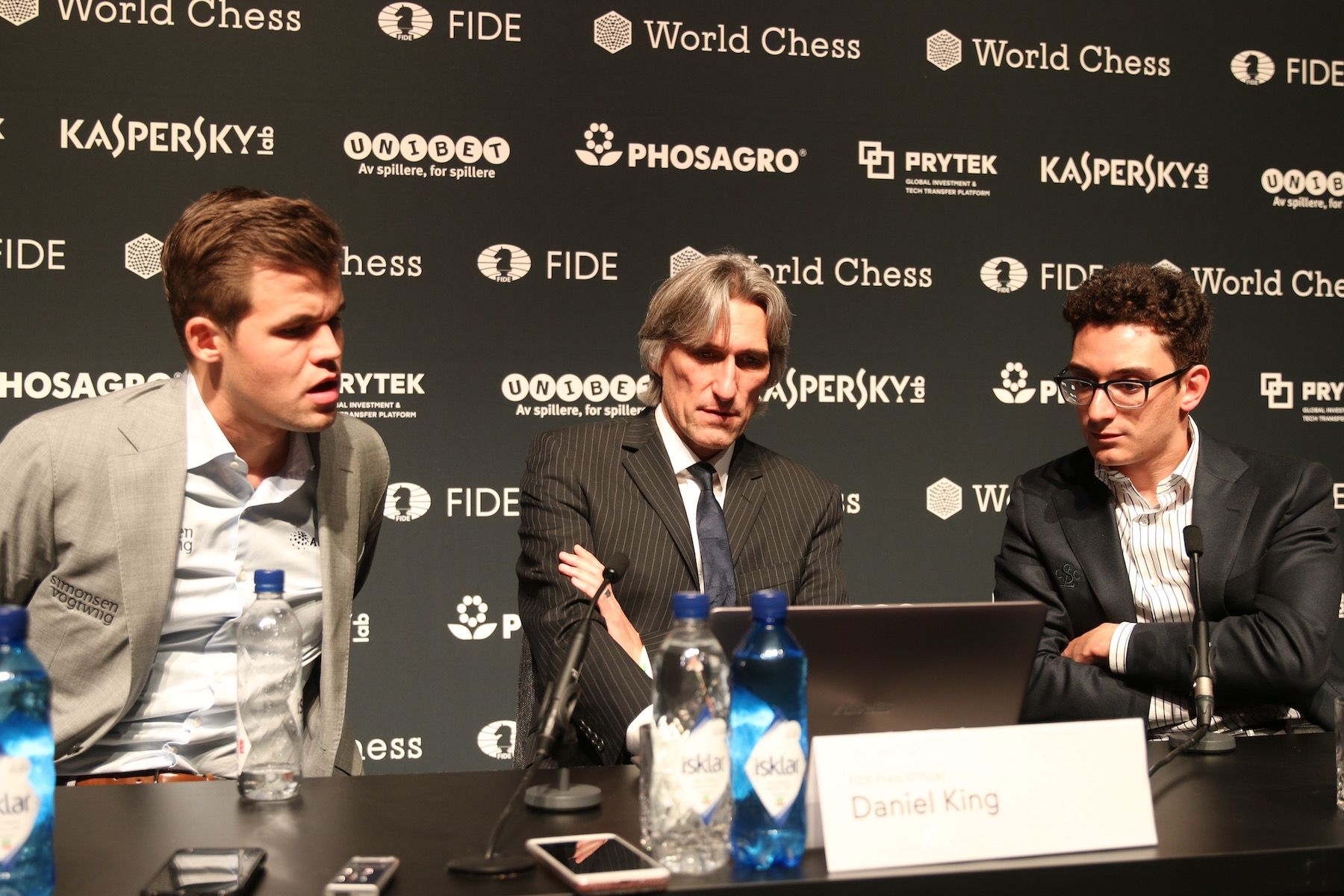
The players with press officer GM Daniel King going through the endgame. | Photo: Mike Klein/Chess.com.
Because watching an entire evening climax in a nervy and baffling endgame battle is thrilling when you get to appreciate how it feels. Any initial concerns about dry play or boredom were swept away by the obvious spectacle of two minds locked in prolonged, mortal, knee-weakening combat. It doesn't need any explaining or apologizing if you undertake to truly and simply watch it, rather than try to rise above it. Do what you need to help you understand the technicalities, but never lose sight of the depth and human drama of this most intense of mental duels.
Appendix:
How hard was that Game six ending?
If you don't believe me tweeting that the odds of this endgame being worked out in old-fashioned adjournment time by a title team were closer to zero than 100, let me close with the words of a real authority.
No. If given that position as a “moves and wins” study, perhaps eventually with process of elimination. But as with many long tablebase wins there’s no obvious logic to the initial sequence to help you. https://t.co/e60xl0nBan
— Garry Kasparov (@Kasparov63) November 17, 2018
Double-take - that's Garry admitting he can't do something on the chessboard.
Predictions?
I stand my ground. I have no idea. They look immovable. The only difference is it is now a lot harder to see the match ending abruptly, but I'll only bet against that with someone else's money.
Related article






